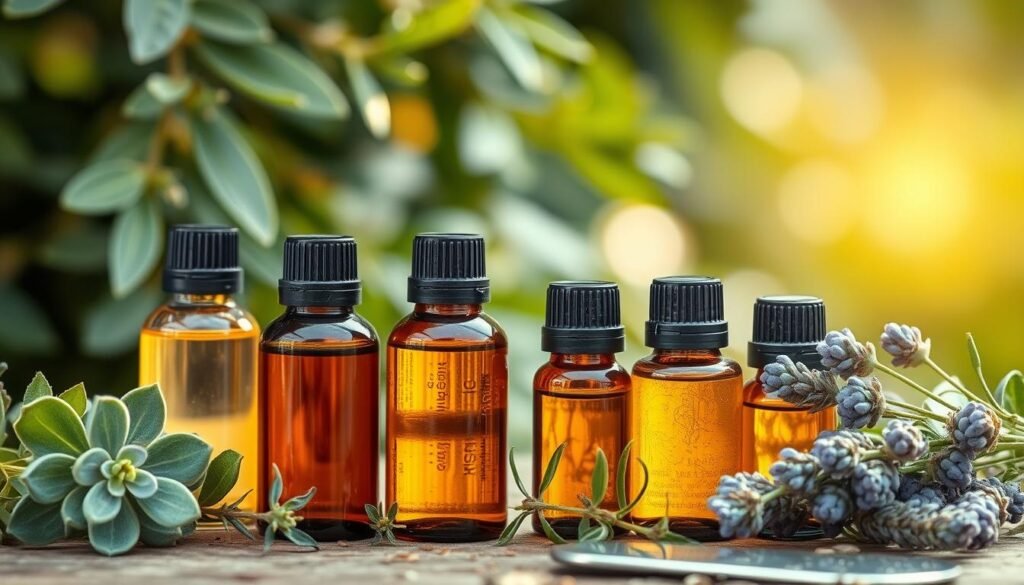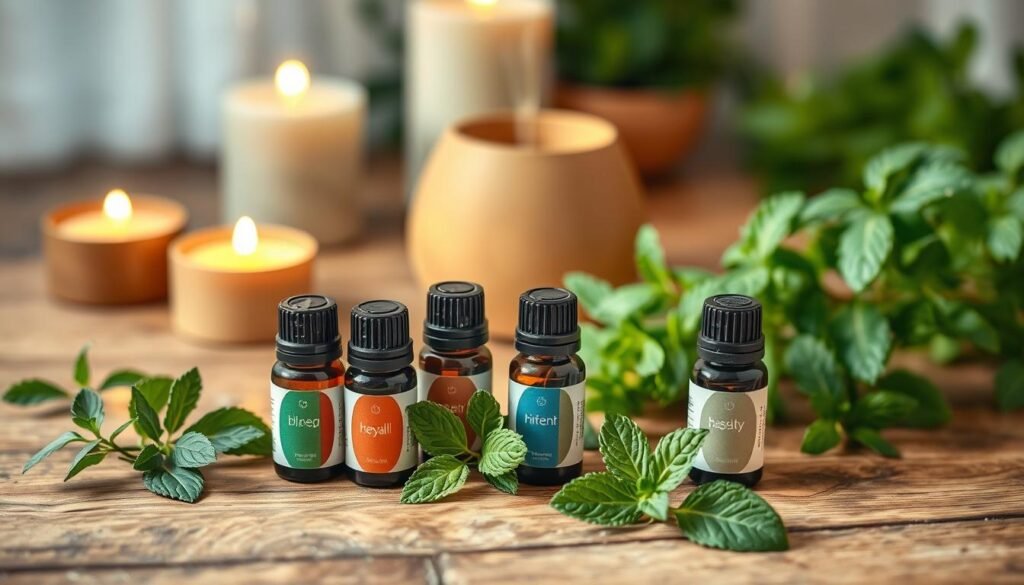Did you know making 1 pound of lavender essential oil needs about 220 pounds of lavender flowers? This fact shows how powerful essential oils are. They’re not a cure for lung cancer but can help as alternative therapy. By offering comfort, they support patients on their journey.
In this guide, we’ll look at how essential oils can help with lung cancer. We’ll talk about their healing qualities. And we’ll cover important safety tips for using them.
Key Takeaways
- Essential oils can complement traditional lung cancer treatments.
- Understanding extraction methods is key to ensuring quality.
- Common essential oils that may assist with lung cancer symptoms include lavender, frankincense, and myrrh.
- Consultation with healthcare professionals is essential for safe essential oil use.
- Research continues on the anticancer properties of various therapeutic oils.
Understanding Essential Oils and Their Uses
Essential oils are growing popular for their health perks and lovely smells. People ask what are essential oils? They are strong plant extracts. These extracts have fragrant compounds that bring unique smells and health benefits. Essential oils come from plant parts like leaves, flowers, and roots. The methods of extraction really shape their quality and what they’re like.
What are Essential Oils?
Essential oils are natural extracts from plants. They capture the plant’s scent and taste. People like them for their healing uses in aromatherapy. This is particularly true for those easing cancer treatment symptoms. Benefits of essential oils range from reducing stress and boosting mood to easing nausea. All because they can work with the brain’s receptors, helping emotional well-being.
Methods of Extraction
The methods of extraction mainly include steam distillation and cold pressing. With steam distillation, steam goes through the plant. This makes the oil turn into vapor and then condense back into liquid. Cold pressing squeezes oil from the citrus rind. How they’re extracted affects their smell, quality, and healing traits.
Essential Oil for Lung Cancer
Essential oils are becoming key in alternative treatments for lung cancer, especially non-small cell lung cancer (NSCLC). Patients are trying different natural methods to improve their health while undergoing standard treatments like chemotherapy or radiation. Essential oils offer support for symptom control, making the treatment process more comprehensive.
Role in Complementary Therapy
Among the array of natural options, essential oil use for lung cancer stands out. These oils complement traditional medical treatments. They aim to lessen side effects and boost life quality. For example, certain essential oils have been found to help with lung cancer patients’ anxiety, nausea, and sleep problems. These oils provide comfort through tough treatment phases.
Managing Symptoms of Lung Cancer
For those fighting lung cancer, managing symptoms is critical. Essential oils have a role here. They bring relief from several issues, including:
- Anxiety: Oils like lavender and frankincense offer calm, aiding in anxiety reduction from cancer treatments.
- Nausea: Citrus oils, like lemongrass, can help control chemotherapy-induced nausea.
- Sleep Disturbances: Aromatherapy with essential oils creates a peaceful environment for better sleep.

Essential oils show promise as an additional therapy option, which stresses the importance of further study. Early results are encouraging, but detailed research is needed. This will confirm their safety and effectiveness for those undergoing cancer treatments.
| Essential Oil | Potential Benefits | Common Uses |
|---|---|---|
| Frankincense | Calming effects, anti-inflammatory | Aromatherapy, topical application |
| Lemongrass | Reduces nausea, uplifting | Inhalation, massage blends |
| Lavender | Reduces anxiety, promotes sleep | Aromatherapy, bedtime routines |
Commonly Used Essential Oils for Lung Cancer Symptoms
Many essential oils aid in managing lung cancer symptoms. They help through their healing properties. They may ease the discomfort caused by cancer.
Frankincense Oil
Frankincense oil is celebrated in traditional medicine for its anti-inflammatory and calming effects. It helps relieve emotional stress. Thus, it’s great for those dealing with lung cancer challenges.
Myrrh Oil
Myrrh oil is known for its pain-relieving abilities. It can lessen the pain and discomfort from lung cancer. It offers a natural way to cope with tough symptoms during treatment.
Clove Oil
Clove oil has antioxidants that may boost wellness during cancer treatments. It strengthens the body’s defenses. This helps those facing lung cancer feel better overall.
Lavender Oil
Lavender oil is prized for its ability to calm. It might improve sleep and lower anxiety. This is especially helpful for those struggling with lung cancer’s emotional impacts.

| Essential Oil | Potential Benefits |
|---|---|
| Frankincense Oil | Anti-inflammatory, calming |
| Myrrh Oil | Pain relief, analgesic properties |
| Clove Oil | Antioxidant support, wellness |
| Lavender Oil | Reduces anxiety, improves sleep |
Benefits of Essential Oils in Lung Cancer Treatment
Essential oils are popular in holistic health for their potential in lung cancer symptom management. They have therapeutic properties useful in cancer care. They help reduce anxiety and manage nausea, common in lung cancer therapy.
Reducing Anxiety and Stress
Lung cancer diagnosis can significantly increase anxiety and stress. Lavender and bergamot oils offer calming effects, promoting emotional well-being. Studies have shown that aromatherapy with these oils can reduce anxiety in cancer patients, making treatment more comfortable.
Alleviating Nausea and Pain
Chemotherapy often causes nausea. Ginger and peppermint oils are effective in managing this. They are known for easing nausea symptoms. Moreover, some essential oils can relieve pain, improving patients’ life quality. Those with lung cancer can use these oils for better nausea management during treatment. For more tips on lung cancer care, check out this helpful guide.

How to Safely Use Essential Oils
Learning how to use essential oils safely is key to enjoying their benefits while avoiding harmful effects. It’s crucial to know how to apply them and how much to use. These factors are vital for getting good results.
Methods of Application
Different ways to use essential oils vary in effectiveness based on what you need. Some common methods include:
- Inhalation: Breathing in the oils helps absorption through the lungs, which is especially good for those with lung concerns. It’s important to be cautious to prevent negative effects.
- Topical Application: Putting diluted oils on the skin can be beneficial in specific areas. Always test on a small skin area first to check for reactions.
- Diffusion: Spreading the oils in the air with a diffuser creates a pleasant atmosphere. It can help with relaxation and breathing problems.
Dosage and Dilution Guidelines
Following dilution guidelines ensures safe use of essential oils. They must be diluted for skin application to lower irritation risks. Here’s the recommended dilution:
| Essential Oil Concentration | Carrier Oil Amount | Essential Oil Amount |
|---|---|---|
| 3% | 10 ml | 3 drops |
| 5% | 10 ml | 5 drops |
Always watch how you react to a new oil. Being cautious helps ensure you have a safe and positive experience with essential oils.
Potential Risks and Side Effects of Essential Oils
Essential oils have many therapeutic benefits. But, it’s important to know their potential risks and side effects. This knowledge helps people make better choices, especially if they’re thinking about using them during lung cancer treatment.
Allergic Reactions and Skin Irritation
Some people might get allergic reactions or skin irritation from essential oils. Allergic contact dermatitis can happen with direct application or if the oils are in the air. It’s wise to do a patch test first, especially for those with sensitive skin or allergies.
Impact on Lung Function
Inhaling essential oils might affect lung function. This could cause coughing or shortness of breath in those with existing lung issues. A study shows a clear link between essential oil use and lung problems when they’re used a lot. Always talk to a doctor before starting aromatherapy to make sure it’s safe for you.
Consulting with Healthcare Professionals
Talking to healthcare experts is key when adding essential oils to cancer care. The importance of medical guidance is huge. Doctors give crucial advice on how oils might affect treatment and health.
Importance of Medical Guidance
Healthcare experts give advice that fits your unique health needs. Knowing how oils like lavender work is important for symptom control. They can ease anxiety and pain but might affect other medicines. Talking to a professional ensures using oils safely. For more info on essential oils in healthcare, check out this resource.
Working with an Aromatherapist
Working with skilled aromatherapists brings big benefits in cancer care. They tailor essential oil use for safety and effectivity. Aromatherapists know the ins and outs of essential oils, offering precise treatment strategies. This helps those looking to ease symptoms or find emotional peace. For those interested in a whole-person approach, learn more about aromatherapy progress at this link.
Current Research on Essential Oils and Cancer
The study of essential oils in treating cancer is getting more attention. Now, scientists are looking into how these natural extracts may fight cancer. This is mostly focused on lung cancer.
Studies on Anti-Cancer Properties
A 2023 study in BMC Complementary Medicine and Therapies showed promising results. It found that M. splendens essential oil could kill lung cancer cells effectively. The oil’s IC50 was less than 20 µg/ml against various cancer cells, including A549, B16-F10, and THP-1.
Researchers identified 22 compounds in the oil, with key ones being bicyclogermacrene, germacrene D, and E-caryophyllene. The oil didn’t just lower the number of A549 cells but also stopped them from spreading. This suggests it could be useful in lung cancer treatment.
The Need for More Research
While results are hopeful, research on essential oils and cancer is still early. Experts call for more detailed studies to understand essential oils’ role in cancer treatment. Over five hundred studies have found their anti-cancer effects, especially for lung cancer.
Yet, we need more clinical trials to know for sure. Studying how essential oils can work with cancer drugs and their unique effects is key. This will help grasp their full potential in cancer care.
Conclusion
Exploring essential oils like frankincense and lavender shows they might help manage cancer symptoms. They could be useful when added to overall care plans. However, they should not replace medical treatment.
Before using essential oils, cancer patients should talk to doctors. Doctors can help make sure these oils are used safely. They watch for side effects such as skin problems or breathing troubles.
More research on essential oils is important. Studies, like the one on Myrcia splendens’ effects on lung cancer, are key. They could improve cancer treatments and life quality. For more info, check this study on essential oils and cancer.